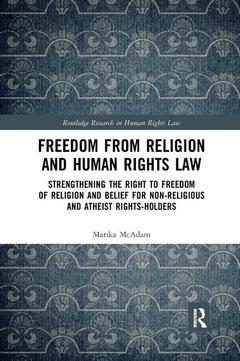Description
Freedom from Religion and Human Rights Law
Strengthening the Right to Freedom of Religion and Belief for Non-Religious and Atheist Rights-Holders
Routledge Research in Human Rights Law Series
Author: McAdam Marika
Language: English
Subjects for Freedom from Religion and Human Rights Law:
Keywords
Pro-religious Bias; Van Der Vyver; right to proselytise; Religious Hate Speech; religious rights of children; Religious Non-state Actors; Asma Jahangir; religious pluralism; International Human Rights Law; Non-theistic Beliefs; Non-proselytising Religions; Hate Speech; Improper Proselytism; Belief Freedoms; Coercive Proselytism; Atheist Parents; CERD Committee; Male Circumcision; ICCPR Right; UK Racial; Ordre Public; Religious Hatred; Major Monotheistic Religions; Reduce HIV Prevalence; Cervical Cancer; Non-religious Beliefs; Abdelfattah Amor; Special Rapporteur
Publication date: 12-2019
· 15.6x23.4 cm · Paperback
Publication date: 11-2017
· 15.6x23.4 cm · Hardback
Description
/li>Contents
/li>Readership
/li>Biography
/li>
Although human rights belong to all persons on the basis of their humanity, this book demonstrates that in the practice of international human rights law, the freedom to be non-religious or atheist does not receive the same protection as the freedom to be religious. Despite the claimed universality of freedom of religion and belief contained in article 18 of the International Covenant on Civil and Political Rights, the key assertion made is that there is a hierarchy of religion and belief, with followers of major established religions enjoying high protection and low regulation at the top, and atheists and non-believers enduring high persecution and weaker protection at the bottom. The existence of this hierarchy is proven and critiqued through three case study chapters that respectively explore the extent to which non-religious and atheist rights-holders enjoy freedom from proselytism, freedom from hate and freedom from the religions of their parents.
Chapter 1: Freedom of Religion or Belief
1. The meaning of ‘religion’ and ‘belief’ in international law
2. ICCPR Article 18 and the plurality of religion and belief
3. Limitations to manifestations
4. Conclusion: The limits of article 18 to protect freedom from religion
Chapter 2: The Hierarchy of Religion and Belief
1. Established, major religions at the top of the hierarchy
2. New, unusual or emerging religions and beliefs
3. Non-religion and atheism at the bottom of the hierarchy
4. Conclusion: Non-religious and atheist rights-holders neglected
Chapter 3: Freedom from Proselytism
1. Proselytism as a manifestation of religion
2. Forms of improper coercion
3. Determining where coercion undermines choice
4. Conclusion: The need to prioritise rights over religions
Chapter 4: Freedom from Hate
1. Article 20 and hate speech in the name of religion
2. Pro-religious bias of article 20
3. Weak protection of non-believers and atheists from hate speech
4. Conclusion: Curtailing religious incitement to violence against atheists
Chapter 5: Freedom from Parents
1. Balancing rights of parents and children
2. Freedom from coercive religious or moral education
3. Freedom from religious circumcision
4. Conclusion: The need to protect children from their parents
Chapter 6: Conclusion
1. Indefensibility of pro-religious bias of human rights law
2. Freedom from religion as the measure of religious freedom
Marika McAdam is an independent legal consultant and adviser who has worked for the United Nations Office on Drugs and Crime, the Office of the High Commissioner of Human Rights, the International Organization for Migration and the Nexus Institute among other organisations.
These books may interest you

Equality, Freedom, and Religion 71.35 €



